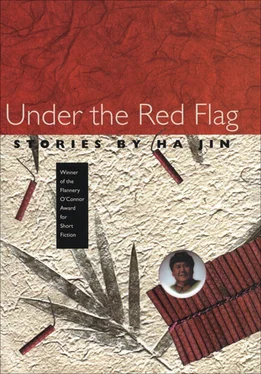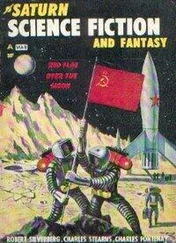No, he must not say anything like that again. It was a matter of life and death. He envisaged his four brothers-in-law, led by their father, brandishing scythes and spades in search of him. Even the two screaming sisters-in-law wanted to scratch and bite him. From now on, every word he said had to be carefully thought out.
On the other hand, if he didn’t satisfy the leaders, they could handle his case in whatever way they liked. They could punish him as a criminal, to warn those who dared to disobey them. Or, at least, they could assign him an extra amount of work every day in the name of reforming him through labor. However well he wrote, he could never please both his in-laws and the leaders.
Full of remorse, he again cursed himself and regretted having the affair with Fuli. Life was so miserable. He had done himself in without second thoughts. If only he could have stopped lusting for women. How wise were Buddha’s words: Desire and lust were the source of disaster. He looked down at his crotch and cursed his penis again. The little devil always went its own way.
He was supposed to turn in the confession the next evening, but he was still on the first page. He had quoted a long passage from Chairman Mao, criticized himself with severe words, and talked about the liberal nature of his offense. Yet these items formed only a beginning to the confession. He had to fill out several pages at least. He was beating his brains about how to continue.
Having mused for hours, he decided to write about the day when they went to bed together. He began with how he had seen his wife off with the chickens in front of the tofu plant, and how he had carried back two buckets of water from the eastern well. When he returned, Fuli was naked on the large brick bed waiting for him. She asked him to bolt the front door, which he did. At first he felt uneasy; then he let himself go and did it with her.
He managed to draft three pages and copied them out in clean handwriting. After reading the manuscript aloud twice, he felt pretty good about it.
The next evening he took the confession to the brigade’s office in hope of persuading the leaders of his sincerity. The same men waited for him. Unlike the last time, a mug of hot tea was on the desk before Lu.
After glancing through the confession, Secretary Zhao handed it to the scribe and asked him to read it out, since Director Wang was illiterate. Zhao lit a cigarette and blew the smoke toward Lu, his narrow eyes fixed on Lu’s sallow face. Lu trembled and looked away.
No sooner had Hsiao finished reading than Wang stood up and pointed at Lu’s nose. “What goddamn confession is this? Screw your ancestors. Three pages full of farts! You took away five pads of good paper but returned only three pages of rubbish. Do you want to confess or not?”
“Yes, I do. S-sorry, I’m still learning how—how to write.”
“Your confession does include one truthful sentence, though,” Secretary Zhao put in. “Do you know what one?”
“No, I don’t. Please enlighten me.”
Zhao picked up a page and read it out. “When I was back with the water, I saw her lying on the bed stark naked, like a huge fresh ginseng-root.” He threw the page on the desk and asked, “Do you know why I say it’s a good sentence?”
“No, I don’t.”
“Because it tells what you saw and how you felt at that very moment.”
“Yes,” Wang said, “Secretary Zhao’s right. Write like he said. Don’t cut corners.”
“We give you a week for a complete confession,” Zhao said deliberately.
“Go home,” Wang ordered, “and recall all the twenty times. Write down all the facts and details. Make no less than a hundred pages.”
Lu managed to get up, but forgot to bow before moving to the door. With his head heavy and something like mosquitoes buzzing in his ears, he staggered out of the office.
He slept only three or four hours every night, working hard on the confession. Still, he wrote no more than five pages and was uncertain if they were acceptable. Of course he dared not tell them anything in detail. That would destroy his sister-in-law’s life. The leaders would surely send a letter to the local Party branch in charge of the area where Fuli was now. Who would want to marry her if everybody knew of what they had done in the cornfields, in haystacks, in bushes, in pigpens, in the pump house? A detailed confession would also ruin his own family—his wife would never come back with his son. He was very lucky that his first-born was a boy, because the rule allowed nobody to have a second child. His luck was what made others jealous, particularly Director Wang, who had only a granddaughter. Because he was a leader and a Party member, Wang couldn’t allow his son’s wife to have another child, thus breaking the rule that everyone was eager to tamper with. Those bastards—they could never bear to see others’ happiness.
Lu’s eyes grew bleary from writing under an oil lamp. Though full of self-disgust, he constantly imagined different ways to get out of the trouble. He knew he could never meet the standard set by the leaders. More than a hundred pages? That was a book, and they might make many copies of it. The whole village would read it, and probably all the commune cadres too. He was no writer and had no time to learn to be one. Even if he were, he wouldn’t dare to write such a book. But in two days he would have to hand it in; by no means could he get it ready. How, oh how could he find a way out of the crisis?
He thought of giving gifts to the leaders, but he wouldn’t have any real money until the end of the year, when the brigade’s annual account was settled. Those leaders wouldn’t accept promises. Four months remained—and no distant water could quench the fire here and now. However, one thing continually came to his mind and tickled his brain: General Chou’s Shrine at Sea-Watch Cliff was said to be about to open after being in ruins for eight years. The temple had been built in memory of a national hero, Chou Wu, who a hundred years ago led the Chinese troops and civilians in burning the ships of the Japanese invaders and driving them back into the sea. In order to inspire patriotism among the Chinese, the present government decided to restore it. Lu heard that the temple was under repair and that monks were being recruited.
The ocean of misery has no bound, he thought; repent and the shore is at hand. Why don’t you give it a try? Good, quit the whole thing. I’ll leave this mess behind and go into the mountain. For sure, they won’t bust the temple and drag me out. That would violate the Party’s religious policy and they would get themselves into trouble. Being a monk, I’ll have time to study, have food and clothes always, and no worry about earthly affairs. I’m fed up with the farm work here. You work your ass off but get no pay if the harvest is poor. Fulan has her place to go; I too have somewhere to stay. I won’t come back, even if she begs me on her knees. Let her learn a lesson from being a widow with a husband alive.
What if you don’t like the temple? Why worry so much? If it’s no good in there, you can always come back. Who’ll force you to be a monk? No time to waste; you must leave as soon as possible. Hide away for a while. In a few weeks I’m sure they’ll lose interest in the case. At least I’ll have enough time there to figure out a new way to deal with them.
A few lines of Chairman Mao’s poetry echoed in his mind: “Many things must be done in a hurry / Heaven and earth spin—time presses / Ten thousand years are too long / We must seize every hour.” Yes, go. The longer the night lasts, the more nightmares will come up.
He got up, grabbed his pen, and wrote on a blank sheet of paper,
Respectable Leaders:
Having understood the gross nature of my crime, I have decided to become a monk. I love our country and am grateful to the Party, but I feel too ashamed to face anybody in the village, so I am leaving now for a temple where I can continue self-examination and self-education. I will study hard there and live a new, peaceful life. Farewell, my dear comrades.
Читать дальше












